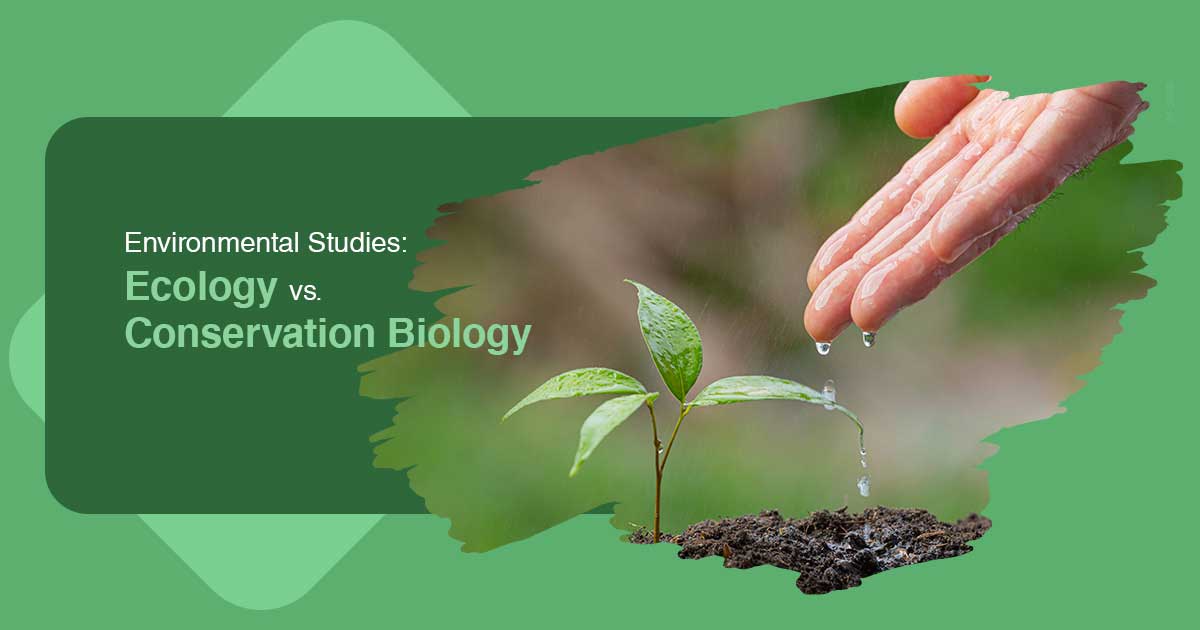Blog Detail


Environmental Studies: Ecology vs. Conservation Biology
01-04-2024

Ecology and conservation biology are two courses closely related to nature and the conservation of nature. Ecology course is defined as the study of organisms, their interactions with nature and how they co-exist in different climatic conditions. Whereas, conservation psychology is the field of science studying the strategies and mechanisms for conserving biodiversity and the impact caused by humans on Earth. Both ecology and conservation biology are integrated with zoology, botany, plant and soil science, principles of evolution and genetics.
However, ecology and conservation biology are two standalone subjects with diverse core areas of study and career opportunities.
Ecology Vs Conservation Biology: Course Duration and Eligibility
The courses for ecology and conservation biology have been designed as standalone bachelors courses. The course duration for both the courses at the undergraduate level is three years with the provision to choose elective subjects. Master’s programmes are available for ecology and conservation biology with multiple specialisations for 2 years
The eligibility criteria for getting enrolled for B.Sc Ecology and B.Sc Conservation Biology is the completion of 12th-grade or equivalent studies with science as a primary subject.
The eligibility criteria for the respective master's course is the completion of bachelor’s programmes with an aggregate accepted by the university.
Ecology Vs Conservation Biology: Course Curriculum
The course curriculum for ecology and conservation biology has been thoughtfully curated after understanding the subject value and the impact it holds on Mother Earth.
The core areas of study in Ecology are listed below:
- Ecology
- Population ecology
- Biology
- Conservation ecology
- Organism
- Population
- Biogeography
- Biosphere
- Ecological anthropology
- Ecosystem
- Environmental Studies
The core areas of study in Conservative Biology are listed below:
- Ecology
- Biodiversity
- Genetics
- Research design
- Biostatistics
- Nature History
- Interactions and field biology
Ecology Vs Conservation Biology: Career Opportunities
With the rising concern for the conservation of nature and the implementation of sustainable living practices, the past decade has witnessed increased demands for ecology and biology graduates. Both fields promise ample amount of career-building opportunities.
Career options for students after opting for Ecology:
- Environmental consultant: Deals with thoroughly assessing and provisioning advisory strategies to environment management concerns.
- Ecologist: Involves in studying the relationship among plants, animals and the environment and implementing necessary steps for the collective betterment.
- Marine biologist: Engaged in studying biological oceanography and taking the necessary actions to preserve aquatic life.
- Environmental Technician: Engaged in monitoring environmental changes and is involved in investigating the sources of pollution, and contamination of resources and finding means to fight against them.
- Environmental biologist: Engaged in using their subject expertise to safeguard human health and the environment.
- Environmental Manager: Studies, designs and implements strategies to promote sustainable practices.
Career options for students after opting for Conservation Biology:
- Conservation Biologist: They work towards minimising the carbon footprint and restoring biodiversity by implementing strategies through their subject expertise.
- Wildlife biologists: They are involved with studying animals and biologists both in the wild and captivity and their interaction patterns.
- Environmental Manager: Works on creating strategies and action plans to ensure sustainability in the corporate development sectors.
- Ecologist: Involves in studying the relationship among plants, animals and the environment and implementing necessary steps for the collective betterment.
- Field Biologist: Engaged in studying the plants and animals in their natural surroundings.
- Marine biologist: Engaged in studying biological oceanography and taking the necessary actions to preserve aquatic life.
- Park Ranger: Looks after the safety and enforcement of laws to ensure the cleanliness and ethical functioning of national parks.
In Short
Ecology and conservation biology are two different yet interconnected streams of life science. Both fields are of equal significance to the overall functioning of the earth as a healthy being for the pivotal role it plays in keeping the earth alive and green. Ecology and conservation biology work towards the safeguarding and protection of Mother Earth and the natural environment by practising sustainable living methods and lessening the impact of carbon footprints. These academic subjects are closely related to zoology, botany, plant and soil study, genetics and environmental science. The three-year undergraduate programmes have been designed by considering the career and practical aspects. The course curricula are advanced and elaborate, thereby increasing the employability of the subject graduates.